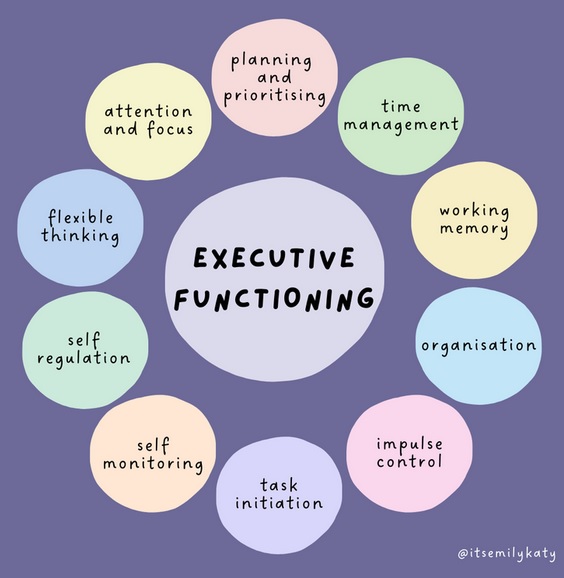Helping Your Child Thrive: Recognizing And Supporting Executive Function Disorder
26th July 2024

We all know that brain plays a vital part in everybody’s life. It helps in controlling our actions, emotions, and thoughts. Brian helps every individual achieve various day-to-day life, short and long-term goals. Such as-
- Leaving the house to go to school
- Eating breakfast
- Taking the bus for travelling
So, the question arises how does the brain manage the hundreds of small activities it is accountable for in order to achieve the larger objectives and goals?
The answer lies in everybody’s cognitive abilities known as “Executive function”. Executive functions includes-
- Self-regulation
- Planning
- Attention
- Inhibition
- Self-monitoring
- Taking Initiatives, etc.
All these self-managing abilities are very essential for every child to thrive in their life, but not every child has the same level of executive functioning, especially children with special needs. These children generally tend to find it difficult to focus on class, become stressed and overwhelmed with tasks, and may exhibit disruptive behaviour. Those educators who have pursued courses like Autism teaching courses know it already.
If you’re facing trouble supporting your children with autism or special needs students who may struggle with some or all executive functions, then we have got you covered.
In this blog post, we will be exploring what executive functions really are, how you can figure out children who struggle with executive functions, and some of the effective and helpful steps to support them.
What is Executive Functioning?

Source: authenticallyemily.uk
Executive function is a set of cognitive abilities functions with which every individual can perform purposeful and goal-oriented activities. They form the brain's "management" system by guiding, controlling, or preventing other activities in order to achieve greater goals.
For example- A student is reading a book’s particular topic and in order to understand it properly, they must focus on the letters, words, and sentences and avoid any other distractions in the environment.
Executive functions are also important for emotional functioning. Because thoughts, emotions, and feelings are closely interlinked with each other that may affect the work or task directly in which the individual is involved.
This indicates that the same processes that regulate our thinking also control our mood, motivation, and interpersonal interactions. Being able to manage one’s attention, override certain impulses, and monitor internal experiences enables everyone to gain an understanding of emotional stimuli (such as people's facial expressions), take the initiative to begin tasks, and deal appropriately with our emotions.
Symptoms of Executive Functioning Related Issues
While some children might be better at certain executive functions than others. However, some children, especially children with special needs may struggle to exhibit executive functions in their life. Below we have shared some of the common symptoms of Executive function dysfunction in some of the children:
- Starting any task independently
- Forgetting their important task or doing their homework
- Couldn’t get an estimation of completing their task
- Get distracted easily
- Having a hard time managing their belongings
- Having difficulty remembering other names or key details
- Having trouble following instructions
- Having trouble retaining information
- Facing difficulty in transitioning from one task to another
- Struggles with any sudden changes liek- seating arrangements, routine or rules change, etc.
- They feel demotivated and disinterested
- They are emotionally volatile
Effective Interventions For Executive Functioning Dysfunction
Let's get to know some of the effective interventions for developing executive functioning skills.
Cognitive Behavioural Therapy (CBT)
Cognitive Behavioural approaches can help children who struggle with executive functioning to develop their social interactions, problem-solving abilities, and various abilities like- developing routines to follow or become more aware.
Cognitive Training & Neuro-feedback
Computer programs like Cogemed (Cognitive training) and Mightier (Neurofeedback) can help children with child-friendly executive function training. While studies show that these programs increase executive functions such as working memory and impulse control, some experts wonder if the benefits transcend beyond the training context and into children's daily lives.
Social & Emotional Learning Programs in School
Many studies have shown that those schools that have included social, emotional, and self-regulatory skills within curriculums or programs tend to improve executive function significantly. Children with special needs learn how to regulate their emotions, active listening, and co-operation skills.
Different Physical Activities & Mindfulness Activities
Taking part in different sports activities like- soccer, and basketball will help children to improve their executive functions. Because it helps children with special needs to utilize their working memory to remember all the rules and movements. This helps to utilize their cognitive abilities to switch between tasks and adapt to the situation. ‘
On the other hand, mindfulness activities help children to manage their anxiety and stress levels, which will help them to not get distracted.
Developing Executive Function Skills in Your Children For Their Growth
Executive function is one of the important skills for every child to thrive in every aspect of their life. However, some students, especially children with special needs struggle to exhibit executive function in their life. With the help of the above-mentioned blog, you can be able to recognize the symptoms of executive functions in children and steps to help them and support them.
If you want to learn more effective and helpful special needs teaching strategies for your special need children, then consider pursuing courses like Online Special Education Courses in Vietnam, where you will get to learn from top experts from the education industry.
We believe education should be accessible for everyone. That’s why we don’t charge for our blogs. Find the right course that will help you in your career with us, contact us at - + (+84) 973240969. You can mail us at act@asiancollegeofteachers.com.